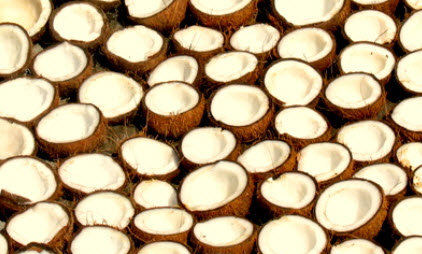High-fat diet postpones brain aging in mice
November 6, 2014

Kerala coconuts (credit: Dan Iserman CC)
A new Danish-led research suggests that signs of brain aging can be postponed in mice if they are placed on a high-fat diet. The finding may one day allow for developing treatments for children suffering from premature aging and patients with Alzheimer’s and Parkinson’s disease.
The new research project, headed by the Center for Healthy Aging, University of Copenhagen, and the National Institute of Health, studied mice having a defect in their DNA repair system, resulting in a Cockayne syndrome. Putting the mice on a high-fat diet postponed aging processes such as impaired hearing and weight loss. In humans, this defect causes patients to prematurely age as children and die at an age of 10–12 years.
“The study is good news for children with Cockayne syndrome, because we do not currently have an effective treatment,” says Professor Vilhelm Bohr of all three organizations, who headed the study. “Our study suggests that a high-fat diet can postpone aging processes. A diet high in fat also seems to postpone the aging of the brain. The findings therefore potentially imply that patients with Alzheimer’s and Parkinson’s disease in the long term may benefit from the new knowledge.”
Our brain has a constant need for fuel in the form of either sugar or ketones. Ketones are the brain’s fuel reserve, and, in particular, play an important role in periods of low blood sugar levels, e.g., if you are fasting. This is because the body breaks down fat if it needs sugar, and during this process it produces ketones. The researchers see a particular positive effect when the mice are given medium-chain fatty acids, such as from coconut oil.
Neurons fueled by fats
“In cells from children with Cockayne syndrome, we have previously demonstrated that aging is a result of the cell repair mechanism being constantly active. It eats into the resources and causes the cell to age very quickly. We therefore hope that a diet with a high content of coconut oil or similar fats will have a beneficial effect, because the brain cells are given extra fuel and thus the strength to repair the damage,” says postdoc Morten Scheibye-Knudsen from the National Institute of Health.
The study was just published in the journal Cell Metabolism. It was supported by the Nordea-fonden through the Center for Healthy Aging.
Abstract of A High-Fat Diet and NAD+ Activate Sirt1 to Rescue Premature Aging in Cockayne Syndrome
Cockayne syndrome (CS) is an accelerated aging disorder characterized by progressive neurodegeneration caused by mutations in genes encoding the DNA repair proteins CS group A or B (CSA or CSB). Since dietary interventions can alter neurodegenerative processes, Csbm/m mice were given a high-fat, caloric-restricted, or resveratrol-supplemented diet. High-fat feeding rescued the metabolic, transcriptomic, and behavioral phenotypes of Csbm/m mice. Furthermore, premature aging in CS mice, nematodes, and human cells results from aberrant PARP activation due to deficient DNA repair leading to decreased SIRT1 activity and mitochondrial dysfunction. Notably, β-hydroxybutyrate levels are increased by the high-fat diet, and β-hydroxybutyrate, PARP inhibition, or NAD+ supplementation can activate SIRT1 and rescue CS-associated phenotypes. Mechanistically, CSB can displace activated PARP1 from damaged DNA to limit its activity. This study connects two emerging longevity metabolites, β-hydroxybutyrate and NAD+, through the deacetylase SIRT1 and suggests possible interventions for CS.